 The time for a revolution of a deeper sort comes when the imbalance of unequal sharing of the land and its resources reaches the ultimate crisis point. People don't want to contemplate this, but at least the unprecedented socioeconomic disintegration ahead will be the portal to achieving real sustainability.
The time for a revolution of a deeper sort comes when the imbalance of unequal sharing of the land and its resources reaches the ultimate crisis point. People don't want to contemplate this, but at least the unprecedented socioeconomic disintegration ahead will be the portal to achieving real sustainability.
This will occur despite any redistribution of present wealth through compassionate reforms or wrenching de-classism. For the hour is too late ecologically. This applies to the entire modern industrialized world.
A great measure of middle and working class affluence has brought European nations together. Rather than serving lofty goals of advancing civilization and peace, it was more to convenience the region's powerful corporations and increase Europe's bargaining muscle for importing energy. Digging deeper into the seamy side, the elevated material life was accomplished largely by borrowing money and wasting material resources (albeit only half as recklessly as the U.S., per capita). The come-down will be far more painful and chaotic than what has been glimpsed, such as the Spanish miners' objections to their getting squeezed. The bright side is that the failure of affluence -- of the post-war European Dream -- will give way to strong local economics and bioregional power.
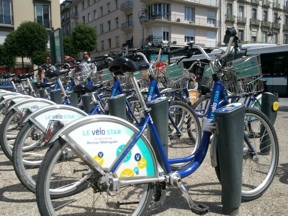
Rennes, capital of Bretagne, has many points for mass bike dist
So the Basques will finally get their country back, as will the Catalans. Native citizens of those quasi nations may have gone along with integration while there was little point in resisting, but when the financial meltdown quickens and economic collapse is more than bitter, they will not tolerate any extra austerity as a sacrifice for struggling southern Spaniards or Greeks.
The progress with renewable energy in several countries, led by Germany, has given hope for a painless transition away from fossil fuels and nuclear power. This attitude may extend to imagining an orderly socioeconomic solution to the brewing financial turmoil. But today's conditions and the heavy dependence on scarcer resources are the opposite of real progress toward sustainability. I base this partly on personal observation; I lived in and visited Europe from 1966-1974. That period wasn't "the bad old days" because there was no solar or wind power then. Rather, the period's lower population (Europe had almost 100 million less than today) and the more open future of four decades ago amounts to an irretrievable past advantage that cannot ever be regained -- unless wrenching transformation will be accompanied by great luck in climate stability.
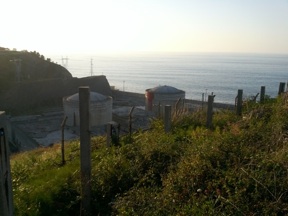
Nuclear power plant permanently unfinished, Basque coast
Except for the hapless Greeks and the poor minority elsewhere in Europe, the people of the Continent still enjoy a splendid material life post post-war. Much of Europe has become a kind of civilized paradise in the minds of many. But the coming loss of affluence will be total, as growth and wealth have almost all come as a result of high net-energy, fossil-fuel exploitation that can't be extended long.
This means that around the corner there will be more than mere mass protest and election surprises. We have only been seeing the calm before the storm. Like North Americans, the practical skills of great-grandparents have been heedlessly forgotten among comfortable, specialized Europeans. As an elderly Basque farmer told me, today's young people have lost the knowledge of living.

Basque flag with A-ddition
The revolution ahead will be of a different nature than the prior political and economic changings of the guard. If in the past a Castro and Guevara could trigger a lasting takeover by invading a colonial outpost, can today's conditions see an ecological and artistic infiltration and takeover? Can the most affluent dominators of nature and their wage-slaves see a better way by joining in the creation of an egalitarian, cooperative society?
It will have to be so, and not because one may want it desperately. The question is whether any awakening and restructuring shall occur before total collapse and chaos, or afterward instead. The impediments to a rational, wise approach are formidable. Foremost of these is petroleum dependence, because of its pervasiveness. When seen only as a long-term issue requiring gradual disengagement, we find we are besieged by alarming -- but in a sense "peripheral" -- threats: nuclear radiation, war, microwaving of our genes, the plastic plague upon our bodies and oceans, sinister alteration of food, water, air and the climate, and shinking civil freedoms.
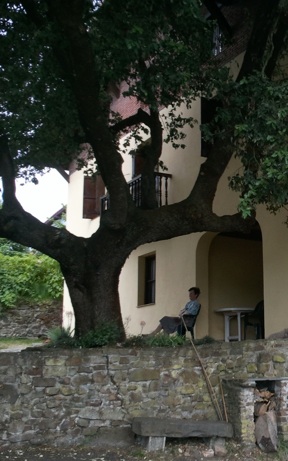
Amaya the farmer; her Basque name suppressed under Franco
The climate can be chosen as the prime issue to address, but success may depend more on a wider, deeper approach than a concentration on climate issues. This is because total "lifestyle-naturizing" is neglected and suppressed, even though it gets to the root. As long as we are separate from nature in our minds or in practice, we are unwelcome invaders in what could be our ever-nurturing home as equals with all other species.
The ecovillage movement can serve as a catch-all for wider adoption of permaculture and communal living. In today's consumerist world, it is unfortunately still a miniscule development. The question is whether it will spread before collapse, to a visible extent, or it must wait until after collapse when eco-living in community is the only game in town.
In comparing Northern American and European subcultures of modernity, one finds in the more sophisticated Old World only a partial escape from the crass commercialization of individualistic, narcissistic living in, even, California. To ask comfortable Europeans as First World citizens to reject technological, exuberant living is on the order of asking the SUV-driving, cancer-ridden consumers of anywhere in the U.S. to abandon unsustainable practices and get back to nature. But if you had to bet which of the two regions has more resiliency, go with the less-corporatized one. And go with the one with closer family relations. Both of these spell community. It's Europe. And it's other regions even more so, not the hapless U.S. Preserving convivial public spaces is another European urban attribute, featuring efficient, elegant, accessible use of land and nature. This fosters community that will come in handy as material wealth subsides and ushers itself into history.

The old and the new, Bretagne
The U.S., as the highest per-capita waster of nature's bounty, has simply twice as far to go as the twice-as-energy-efficient Western Europe. But the slightly less oppressed European citizens, with better health care and more liberal vacation rights, might see their advantages erode ever more rapidly; using only half of what a glutton does just ain't enough. For U.S. consumers facing the end of petro-affluence, it is pitiable that a 50% reduction in energy use is no longer a reasonably sufficient goal. Yet, what we hear from quasi-green leaders such as the Sierra Club is that Americans simply must drive, so the only choice is to give them more-efficient electric cars as a [non]solution.
The rising police state, to the liberal or radically minded activist anywhere, is understandably alarming and deserves resistance or avoidance. To stand up in its way may be folly and misdirected, unless martyrdom or educating the masses is all important. We must fact the fact that, for better or worse, order must be somehow maintained when untold millions of people want their accustomed subsistence and convenience -- especially as deprivation sets in. It's not going to get any prettier for quite a while. The accomplishments of technological progress and civilization are fleeting, as history will show. Momentary compassion for suffering multitudes is commendable, but should not blind us to reality or a longer-term vision that truly ensures compassion.
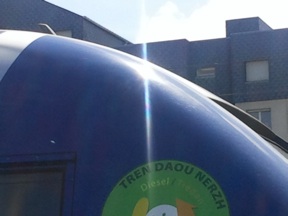
Electric/diesel hybrid high-speed train (Breton Celtic language)
There is no answer to any of this modern dilemma of ballyhooed prosperity amidst planetary exploitation, oppression and corruption. Yet, jettisoning the fear of losing both central banking and the Euro may be aided by considering better alternatives, such as the advantages of local currencies for towns. Consider the Argentines' surmounting the collapse of the nation's neoliberal economy over a decade ago.
The individual caught in today's global economy can, in the absence of a triumphant Occupy movement that goes beyond opposing austerity, make liberating strides for survival. What must be a spiritual, life-changing process can come about by abandoning past assumptions of incremental steps toward better governmental representation. Self-rule is possible to a greater degree in almost everyone's case. When enough people participate and find each other, there can be hope for finding no end of solutions for more healthful, healing co-existence. It will not and cannot be provided by leaders, who can only point the way (if they only would!). Bravo to all the struggling souls feeling the need for overdue fundamental change.
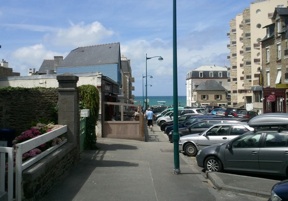
Les vacances et les voitures coutent beaucoup
Good luck and peace to all -- a tall order.
- Jan Lundberg
Barcelona, Catalunya, and the Basque Country, July 20-22; Bretagne, July 28; Portsmouth, July 30, 2012.
* * * * *
Photos by Jan Lundberg
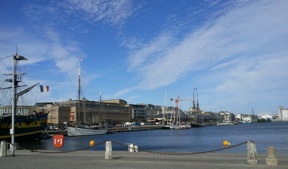
The old and the new in Saint-Malo
Email this
Comments (5)

Write comment
